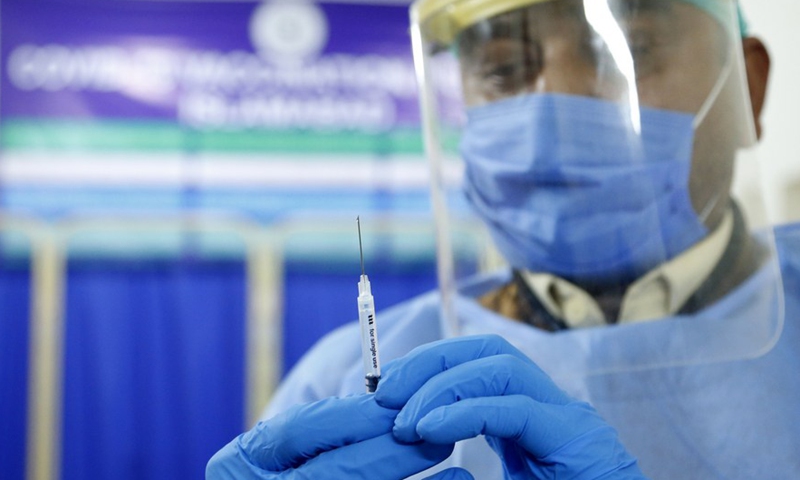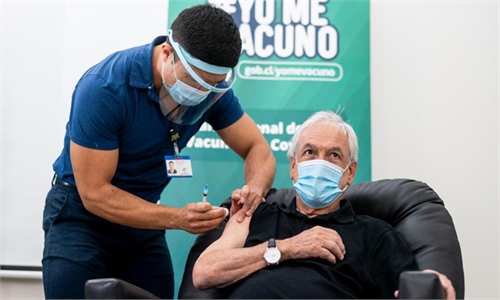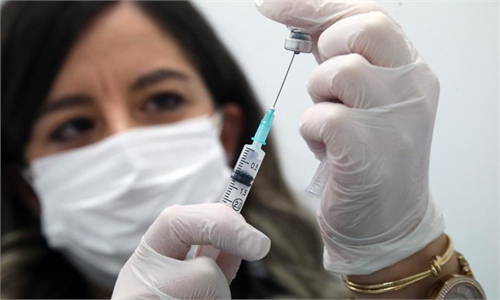More countries in LatAm, Asia and Europe give vote of confidence to Chinese vaccines

A medical worker prepares a dose of COVID-19 vaccine at a hospital on the outskirts of Islamabad, capital of Pakistan, Feb 4, 2021.Photo:Xinhua
As more countries in the Middle East, South Asia and Eastern Europe have cast a vote of confidence in China's COVID-19 vaccines, China has secured contracts for more than 500 million doses of vaccine from 16 countries and regions.
Pakistan approved Chinese company CanSinoBio's COVID-19 vaccine for emergency use in the country, Pakistani Health Minister Faisal Sultan said on Friday, making it the second country to approve this one-dose vaccine following Mexico's approval on Wednesday.
The first batch of 35 million doses of the CanSino vaccine arrived in Mexico on Thursday to support the local vaccination campaign.
Bolivia, the Philippines and Hungary have all confirmed on Thursday they would receive batches of hundreds of thousands of doses from China in February.
Hungary will become the first European Union country to receive next week 500,000 doses of COVID-19 vaccine produced by China's state-owned pharmaceutical firm Sinopharm, and plans to start vaccination as soon as possible, the Hungarian prime minister's office announced Monday.
Bolivia's President Luis Arce on Thursday said a mass vaccination campaign would begin this month, following an agreement signed earlier in the day with China for the supply of Sinopharm's vaccine, while Serbia received half a million doses from Sinopharm on Wednesday, adding to 1 million already delivered in January.
Meanwhile, on Thursday, Turkish President Recep Tayyip Erdogan announced on his social media accounts that he took his second dose of the Chinese COVID-19 vaccine produced by Sinovac.
The number of people who had received their first doses of China's Sinovac COVID-19 vaccine topped 3 million on Friday across Turkey, the Turkish Health Ministry announced.
Some Southeast Asian countries have also greenlighted Chinese vaccines for emergency use as Myanmar's Food and Drug Administration authorized the use of a Chinese-made COVID-19 vaccine, Myanmar Commander-in-Chief of Defense Services, Senior General Min Aung Hlaing, said on Thursday.
Laos and Brunei also received shipments of donated doses from China in recent days, media reported.
Some African countries, most of which developing countries, said they are in talks with China in the hope of securing more coronavirus doses amid the world's race for scarce jabs.
Equatorial Guinea said on Thursday that 100,000 donated doses of the Sinopharm vaccine had arrived, becoming China's first batch of vaccine aid to the African continent.
Bolivia's President Luis Arce on Thursday said a mass vaccination campaign would begin this month, following an agreement signed earlier in the day with China for the supply of Sinopharm's vaccine, while Serbia received half a million doses from Sinopharm on Wednesday, adding to 1 million already delivered in January.
Meanwhile, on Thursday, Turkish President Recep Tayyip Erdogan announced on his social media accounts that he took his second dose of the Chinese COVID-19 vaccine produced by Sinovac.
The number of people who had received their first doses of China's Sinovac COVID-19 vaccine topped 3 million on Friday across Turkey, the Turkish Health Ministry announced.
Some Southeast Asian countries have also greenlighted Chinese vaccines for emergency use as Myanmar's Food and Drug Administration authorized the use of a Chinese-made COVID-19 vaccine, Myanmar Commander-in-Chief of Defense Services, Senior General Min Aung Hlaing, said on Thursday.
Laos and Brunei also received shipments of donated doses from China in recent days, media reported.
Some African countries, most of which developing countries, said they are in talks with China in the hope of securing more coronavirus doses amid the world's race for scarce jabs.
Equatorial Guinea said on Thursday that 100,000 donated doses of the Sinopharm vaccine had arrived, becoming China's first batch of vaccine aid to the African continent.

The vaccine developed by China’s Sinovac. Photo: VCG
South Africa halted the rollout of AstraZeneca's COVID-19 vaccine in early February after preliminary data found it offered minimal protection against mild and moderate infections from a fast-spreading new strain of coronavirus first detected in the country.
South African media have reported that the local government is also in talks with vaccine manufacturers in China, Russia and other countries as alternative choices.
Nigerian Foreign Minister Geoffrey Onyeama confirmed on February 5 that talks were ongoing with China to secure large quantities of COVID-19 vaccines, as the country has been desperate to get 100,000 doses of Pfizer vaccine through the Global Alliance for Vaccines and Immunization, WHO's global health partnership dedicated to "immunization for all."
As scheduled, a batch of COVID-19 vaccines provided by China will arrive in Harare, the capital of Zimbabwe, on Monday, Zimbabwean Information Minister Monica Mutsvangwa said on Tuesday, adding that the vaccine, totaling 200,000 doses, was produced by Sinopharm.
Global Times


